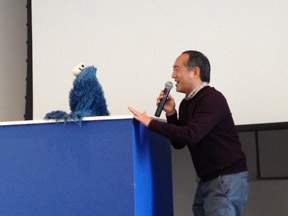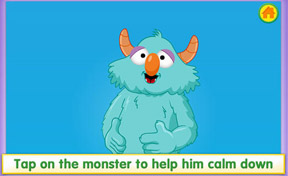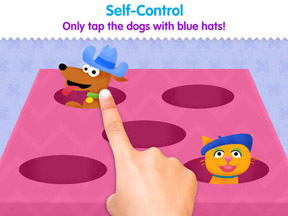
Sesame Street turns 45 this year, and this past Tuesday, Sesame Workshop hosted a digital playground event in New York City to show off new apps, e-books, and other multimedia offerings for children age 5 and younger. During the morning-long event, several dozen little ones got to play test the latest in Sesame Street-branded games, which were set up at iPad stations. They also watched long- and short-format clips of Sesame Street online, courtesy of the brand’s latest digital video platforms.
During his welcome to guests, Scott Chambers, senior vice president of worldwide media distribution for Sesame Workshop, said that Sesame Street currently has an audience of roughly 5 million viewers on PBS. However, he pointed out that among the most recent generation of viewers, 63 percent of that audience is introduced to the program digitally; hence, Sesame Workshop’s latest efforts to develop the brand across a number of digital platforms.
Chambers, along with guest speakers Cookie Monster and Alan Muraoka of Sesame Street fame, took turns emphasizing the importance of self-regulation for kids–a theme reflected in several apps on-hand. One of the newest, Breathe, Think, Do with Sesame, teaches kids ages 2 to 5 how to deal with tough emotions by letting them play as a cute horned monster. Kids are presented with a choice of problem scenarios, such as having trouble getting dressed or getting ready for school, and then a choice of possible solutions.
 Adopting the titular strategy of Breathe, Think, Do, kids can tap the monster’s belly to make it take a series of deep, calming breaths. Also, while thinking up problem-solving ideas, kids can tap on floating bubbles to pop them. Breathe, Think, Do, with Sesame is part of Sesame Workshop’s series of Community & Family Engagement Apps, and is available in both English and Spanish.
Adopting the titular strategy of Breathe, Think, Do, kids can tap the monster’s belly to make it take a series of deep, calming breaths. Also, while thinking up problem-solving ideas, kids can tap on floating bubbles to pop them. Breathe, Think, Do, with Sesame is part of Sesame Workshop’s series of Community & Family Engagement Apps, and is available in both English and Spanish.
Another cool new Sesame Workshop app is Cookie Monster’s Challenge, by PBS Kids, in which kids play a series of mini-games in order to build a cookie-delivering contraption. The mini-games involve such tasks as matching sounds to on-screen instruments, drawing the missing wings onto a butterfly, and tapping cats as they pop up on-screen. In keeping with the theme of teaching self-regulation, some of the games involve not touching an on-screen object, no matter how tantalizing it makes itself (And in the case of a cartoon pig that walks very slowly across the screen, that’s pretty darn tantalizing).
 In order to make Cookie Monster’s Challenge engaging without being frustrating, the most difficult levels are locked, so kids have to succeed at the earlier ones to get access. In addition, users get subtle, but helpful cues in each mini-game: For example, for the one in which instruments must be matched to sounds, the musical sounds always replay in the same sequence for do-over rounds. According to a Sesame Workshop representative, the tiered levels of support are so success is ultimately possible for young users, even if they aren’t ready when they first start playing.
In order to make Cookie Monster’s Challenge engaging without being frustrating, the most difficult levels are locked, so kids have to succeed at the earlier ones to get access. In addition, users get subtle, but helpful cues in each mini-game: For example, for the one in which instruments must be matched to sounds, the musical sounds always replay in the same sequence for do-over rounds. According to a Sesame Workshop representative, the tiered levels of support are so success is ultimately possible for young users, even if they aren’t ready when they first start playing.
Sesame Workshop also showed off its new subscription video on demand service, Sesame Street Go, the re-launched sesamestreet.org web site, the digital magazine Sesame Street S’More!, and the new series, The Furchester Hotel, which is co-produced with CBeebies.

